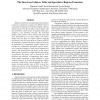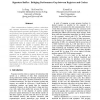54 search results - page 5 / 11 » Using a Swap Instruction to Coalesce Loads and Stores |
MICRO
2000
IEEE
13 years 11 months ago
2000
IEEE
Register promotion is an optimization that allocates a value to a register for a region of its lifetime where it is provably not aliased. Conventional compiler analysis cannot alw...
HPCA
1995
IEEE
13 years 11 months ago
1995
IEEE
Information on the behavior of programs is essential for deciding the number and nature of functional units in high performance architectures. In this paper, we present studies on...
HPCA
2004
IEEE
14 years 7 months ago
2004
IEEE
Data communications between producer instructions and consumer instructions through memory incur extra delays that degrade processor performance. In this paper, we introduce a new...
HPCA
1998
IEEE
13 years 11 months ago
1998
IEEE
Dependences among loads and stores whose addresses are unknown hinder the extraction of instruction level parallelism during the execution of a sequential program. Such ambiguous ...
IBMRD
2006
13 years 7 months ago
2006
Because they are based on large content-addressable memories, load-store queues (LSQ) present implementation challenges in superscalar processors, especially as issue width and nu...


